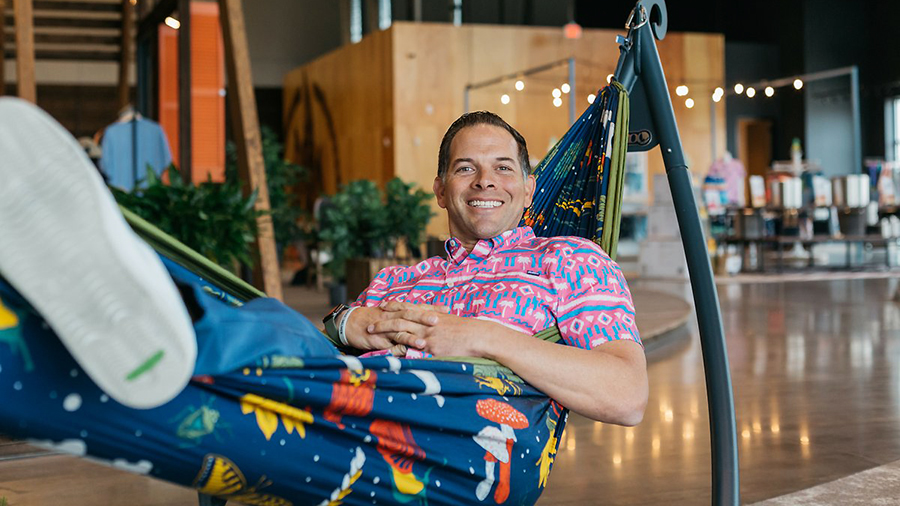Solo Brands, Inc.’s sales expanded 7.3 percent in the first quarter, topping expectations, as fill-ins address early sell-through. The replenishment orders helped the company boost Q1 wholesale revenues to offset declines in its e-commerce business.
CEO John Merris said on an analyst call, “We were encouraged to see larger replenishment orders than we expected, reflecting earlier sell-through at retail.” He added, “Even so, our first high season of the year is just kicking off, and we will know more about full sell-through as we get through the rest of Q2.”
Solo Brands’ portfolio includes Solo Stove, Chubbies, Oru Kayak, and Isle.
Wholesale revenues surged 52.3 percent to $33.5 million, boosted by increased shelf space and a higher door count with existing customers. DTC revenue decreased 9.1 percent to $54.8 million in line with expectations with consumer traffic lighter.
Merris said the strength in its wholesale channel allowed the company to be less promotional than in the same period in the prior year without negatively impacting overall new customer acquisition. He added, “Our new products and innovation continue to be a draw for new and existing customers, reflected in our consistently high referral and repeat purchase rates.”
Gross margins in the quarter increased to 61.7 percent compared to 59.4 percent, driven by lower promotions, primarily in the DTC channel.
SG&A expenses decreased 2.2 percent to $44.6 million, or 50.6 percent of sales from 55.5 percent a year ago. The variance was driven by a $5.4 million decline in variable costs, partially offset by $4.3 million higher fixed costs. The decline in variable costs was due to lower marketing expenses driven by benefits from data investment. The fixed cost increase was primarily due to higher employee-related expenses, including increased headcount from investments that were made in the year-ago second quarter.
Net income was $924,000, or 1 cent a share, against a loss of $2 million a year ago. On an adjusted basis, earnings were 16 cents a share, down from 19 cents a year ago. Adjusted EBITDA grew 10.0 percent to $15.4 million from $14.0 million.
Looking forward, Merris said the company would continue to focus on innovation, broadening wholesale partnerships and expanding internationally to build on its momentum for the rest of the year.
On innovation, Merris said the company continues to benefit from product development through a continual customer feedback loop that comes from a DTC focus. He said, “We continue to find new ways to innovate and expand our product line, and we are excited to continue delivering a healthy lineup of new products in the remainder of this year. Continuous product development not only helps attract new customers but is also easily marketable to our existing customer database, which drives repeat purchases, increases lifetime value and lowers our overall customer acquisition costs.”
Merris said Solo Brands continues to have “very positive” conversations with wholesale partners, focusing on expanding into new doors and increasing shelf space with existing doors. Merris said, “While the wholesale channel is very exciting, we are in the early innings of its growth story. To that end, we are disciplined in managing our sell-in rate by keeping a close eye on our sell-throughs.”
Solo Brands is also looking to extend its strength in customer engagement at its DTC channels to wholesale. Merris said, “We believe that working with our retailers to develop greater brand affinity will lead to stronger sell-throughs and increased shelf space and our existing customers, all while driving healthy merchandise margins.”
Internationally, Solo Brands has invested in local leadership in Europe and is exploring new markets, including Asia. Said Merris, “We continue to believe that our international business can grow to be the size of our domestic business.
Solo Brands reaffirmed its guidance for the full year that calls for sales in the range of $520 million to $540 million, up from $517.6 million in 2022.
In light of the current environment, Solo Brands forecasted revenue at the midpoint of its range and EBITDA margin in the range of 16.5 percent to 17.5 percent, which compares to 16.9 percent in 2022.
Merris said, “We are operating in an uncertain macro environment where consumers are being selective in their purchases; however, our direct connection to customers, combined with strong execution by our team in the three areas mentioned before, product innovation, channel expansion and international growth, create a wide competitive moat around our business and most importantly, create a foundation for years to come.”
















